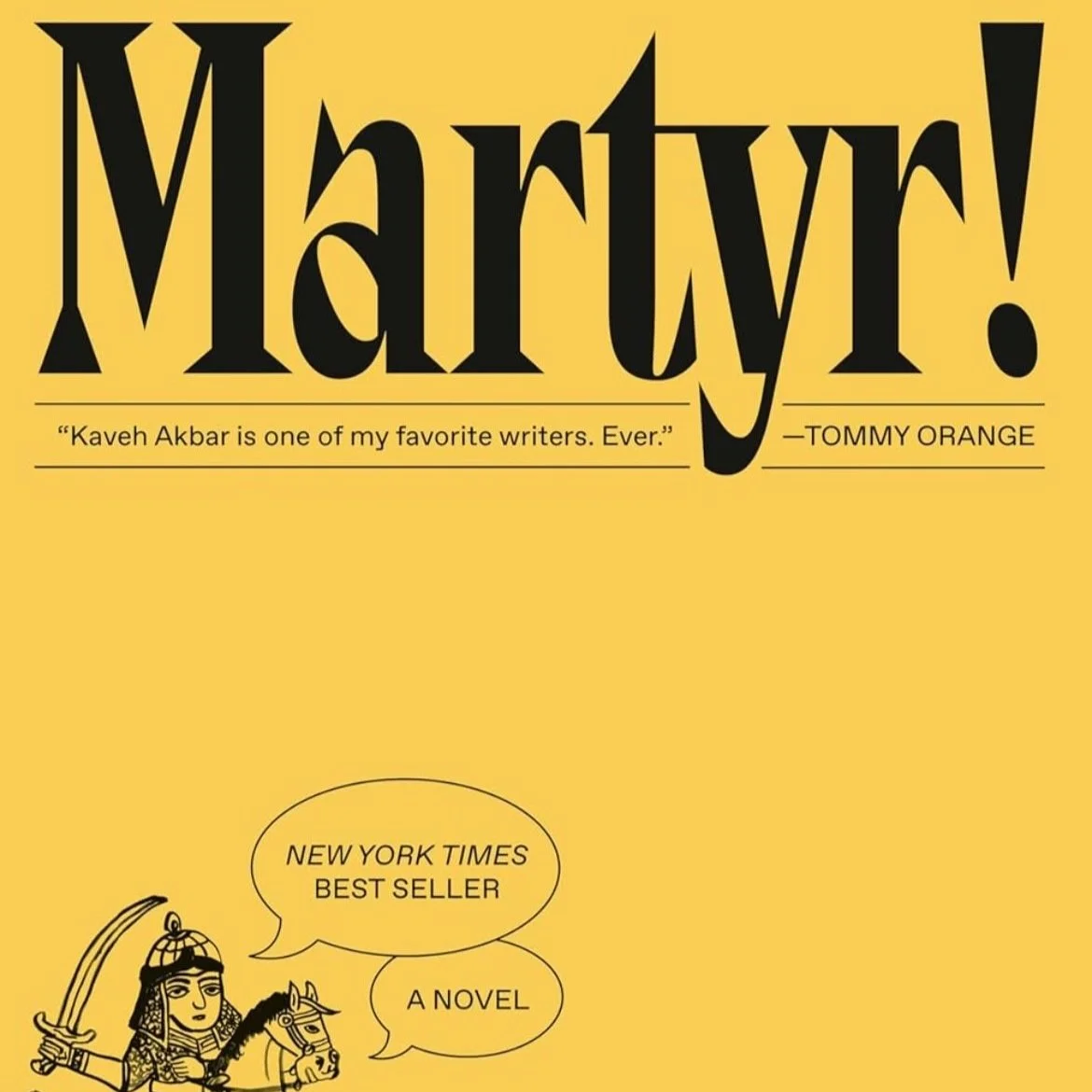Book Review of "Martyr!" written by Kaveh Akbar by Rey M. Rodríguez
Martyr! by Kaveh Akbar
By Rey M. Rodríguez
“Martyr!” by Kaveh Akbar is a book about many things, but at its core, it explores how to live a meaningful death. This premise shocked me because I am an optimistic fellow constantly seeking the answer as to how to live a meaningful life. After the death of my father, I experienced a moment of clarity that lasted about a year. I was profoundly grateful for living, and almost every act of kindness, no matter how small or seemingly inconsequential, became important. I was thanking people on the street for their smiles and how they made me feel. It was impossible to keep up this level of clarity and gratitude. Being grateful was bound to end. And after a year, it did. It ended, much like a sunset does when it goes beyond the horizon.
Death profoundly informs life. That notion has been written about many times, but the exploration of a martyr’s life has not. This book examines this question in such a satisfying and nonpatronizing manner. The characters are so rich and complex. It is the story of Cyrus, who is newly sober and orphaned by his Iranian immigrant parents, as he tries to understand his life in the United States. He is guided by artists, poets, friends, and family, while he embarks on a remarkable search for meaning from Indiana to New York City. While in the City, he meets a terminally ill painter living out her final days in the Brooklyn Museum. It is the dialogue in the book that is both haunting and, at times, spiritual.
For example, early on in the book, Cyrus (pronounced “sigh-e-ROOSE” if said the “Iranian way” according to the book) explains his project, which he is not sure is a novel yet, by saying: “I’m not really sure yet. But my whole life, I’ve thought about my mom on that flight, how meaningless her death was . . . The difference between 290 dead and 289. It’s actuarial. Not even tragic, you know? So was she a martyr? There has to be a definition of the word that can accommodate her. That’s what I’m after.” Cyrus’ lament felt haunting to me because why would a son think that his mother’s death was meaningless? But then I began to understand and empathize with his trauma and his need to create some sort of art – a novel, a painting, something – to understand his pain’s meaning. I went through the same thing when my parents died.
There are many places in the book where the dialogue rises to an ethereal, spiritual level, but one in particular comes late in the book. There is an exchange between Cyrus and his uncle, who is elderly and still lives in Iran. Cyrus has called him not to learn how he is doing, but to see if the uncle knows the name of a painting that depicts a man in a black robe and a lamp riding a horse, trying to give comfort to dying Iranian soldiers who think he is an angel. During the Iran-Iraq war, the uncle’s job every night after the battle was to get on a horse and wear a long, black robe. He wanted to give people a glimpse of an angel, of something celestial and holy in their last dying moments to embolden them in their dying, to persuade them to die with dignity. Instead of answering the question, the uncle describes how a cassette of the “Allegri’s Miserere” had been stuck in his car’s audio player. The uncle explains, “And do you know what happened? What changed?” “What?” said Cyrus. “Nothing. It felt like a miracle every time. It didn’t matter if I came in just for the last minute, the last ninety seconds of the tape. There were five voices and I heard something new every time. The idea that someone, a child [Mozart], could hear it once or twice and remember everything, and I could hear it a thousand times like I’d never heard it once before? What does that tell you?” (Akbar 228). Cyrus is unable to answer. He was confused by the question. He had never even heard the music. The uncle responds, “You wouldn’t understand even if you heard it, nephew. Get it? I listened to it and see God in it because I’ve been God...” (Akbar 229). It is an extraordinary exchange because some things can’t be explained unless lived. When trying to create sublime art, the artist must have been exposed to it or have experienced it in life. It is almost an invitation to go and seek great art and have it transform you. I invite you to read this book because it will enrich your ideas of life and death.
Rey M. Rodríguez is a writer, advocate, and attorney. He lives in Pasadena, California. He is working on a novel set in Mexico City and a non-fiction history of a prominent nonprofit in East LA. He has attended the Yale Writers' Workshop multiple times and Palabras de Pueblo workshop once. He also participates in Story Studio's Novel in a Year Program. He is a first-year fiction creative writing student at the Institute for American Indian Arts' MFA Program. This fall his poetry will be published in Huizache. His other interviews and book reviews are at La Bloga, the world's longest-established Chicana-Chicano, Latina-Latino literary blog, Chapter House's Storyteller’s blog, IAIA's literary journal, Pleiades Magazine, and Los Angeles Review.

